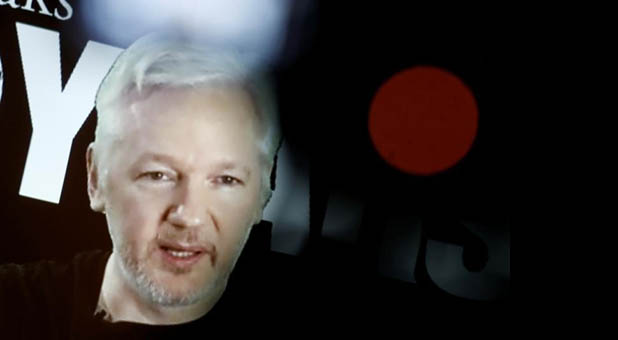WikiLeaks: 1979 Was ‘Zero Year’ For the Modern Era
The year 1979 saw a tremendous amount of tumult that continues to impact not just the U.S., but the world, even today.
In a new release from WikiLeaks, the anti-secrecy organization’s cofounder, Julian Assange, describes 1979 as the “zero year” of the modern era. Among the things that took place that year:
- the Iranian Revolution and the Iranian hostage crisis,
- Saddam Hussein’s coming to power in Iraq,
- the Soviet invasion of Afghanistan,
- the U.S. and China’s resumption of diplomatic relations,
- the signing of the Camp David Accords by Anwar Sadat of Egypt and Menachem Begin of Israel,
- the nuclear accident at Three Mile Island,
- the election of Margaret Thatcher as British prime minister,
- the signing of the SALT II nuclear arms reduction treaty between the U.S. and Soviet Union and
- the assassination of South Korean President Park Chung-hee (father of current South Korean President Park Geun-hye).
Those are but a few of the major events of 1979 covered in the 531,525 diplomatic cables released as part of WikiLeaks’ Public Library of U.S. Diplomacy, also known as “Plus D.” Much more is contained in the “Carter Cables III” release, which Assange describes as follows:
If any year could be said to be the “year zero” of our modern era, 1979 is it.
In the Middle East, the Iranian revolution, the Saudi Islamic uprising and the Egypt-Israel Camp David Accords led not only to the present regional power dynamic but decisively changed the relationship between oil, militant Islam and the world.
The uprising at Mecca permanently shifted Saudi Arabia towards Wahhabism, leading to the transnational spread of Islamic fundamentalism and the US-Saudi destabilization of Afghanistan.
Osama bin Laden would leave his native Saudi Arabia for Pakistan to support the Afghan Mujahideen.
The invasion of Afghanistan by the U.S.S.R. would see Saudi Arabia and the CIA push billions of dollars to Mujahideen fighters as part of Operation Cyclone, fomenting the rise of al-Qaeda and the eventual collapse of the Soviet Union.
The 1979 current of Islamification spread to Pakistan, where the U.S. Embassy was burned to the ground and Pakistan Prime Minister Zulfikar Ali Bhutto was executed.
The Iranian hostage crisis would go on to fatally undermine Jimmy Carter’s presidency and see the election of Ronald Reagan.
Saddam Hussein took power in 1979.
The rise of al-Qaeda eventually bore the September 11, 2001 attacks in the United States, enabling the U.S. invasion of Afghanistan and Iraq and over a decade of war, leaving, at its end, the ideological, financial and geographic basis for ISIS.
The Iranian revolution and Saddam Hussein’s rise to power and the subsequent Iran-Iraq War would connect with the 1979 Sandinista revolution in Nicaragua to produce the Iran-contra affair and the indictment of 12 U.S. administration officials, including Secretary of Defense Caspar Weinberger.
Elsewhere, Thatcher won in the U.K., Rhodesia became Zimbabwe, Idi Amin fled Uganda and the ANC made the decision to militarily resist apartheid.
In the United States, the Three Mile Island nuclear incident led to a turning away from the construction and development of new nuclear reactors, increasing the reliance on oil and coal for decades.
While the 1979 SALT II agreements made some progress in reducing the risk of nuclear war, nuclear preparations and testing were stepped up elsewhere. The U.S. decided to place Pershing and cruise missiles in Europe and a South African/Israeli nuclear test was detected by U.S. early-warning satellites.
China officially came in from the cold, and Deng Xiaoping visited the United States in a defining strategic reorientation by both states.
In 1979, it seemed as if the blood would never stop. Dozens of countries saw assassinations, coups, revolts, bombings, political kidnappings and wars of liberation.
In the extremes and contestations of the Cold War, 1979 saw some grim culture to go with the times: ACDC produced “Highway to Hell,” Francis Ford Coppola gave us Apocalypse Now while for Pink Floyd it was just “Another Brick in the Wall”.
The Carter Cables III bring WikiLeaks’ total published US diplomatic cable collection to 3.3 million documents.
Monday was the sixth anniversary of the first “Cablegate” leak of 251,287 diplomatic cables spanning from 1966 to 2010, which were allegedly obtained from U.S. Army Pvt. 1st Class Bradley Manning, who now identifies as “Chelsea.” Manning was court-martialed and sentenced to 35 years in prison after pleading guilty; he was also reduced in rank to private.
WikiLeaks has been seeking to have Manning’s sentence commuted. {eoa}
















































